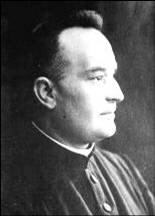Germany 1941
Martin Bormann, one of the prominent Nazis, wrote in 1930: "National Socialist and Christian concepts are incompatible. All structures which influence people which in any way could weaken or impair the Führer and the National Socialist Party, must be eliminated." (The Century of Martyrs, Riccardi, p. 79)
Though religious communities appeared weak in the eyes of the Nazis (compared to the hierarchy), they soon proved to be even more inflexible, and thus drew the attention of National Socialists. In 1935 the National Socialists enacted strict exchange restrictions which affected religious congregations, including The Priests of the Sacred Heart. Fr. Franz Loh, provincial superior from 1932 to 1936 quickly understood the future of the congregation in Germany was at stake. Since it was not possible to save the house at Sittard by legal means he resorted to sending it funds secretly.
In 1935, after Fr. Philippe had been made bishop " he came to Sittard in order to ordain the deacon class of the German province to the priesthood. On the day after their ordination the house received frightful news. The German secret police (Gestapo) had discovered all. A German laybrother who had Nazi leanings had turned them in." (Bothe, Dehoniana 2000/3, p. 80)
In April of 1936 a trial took place at Krefeld. Some of the accused scjs were already in prison while others like Fr. Loh were fugitives. Thirteen scjs were fined and sentenced to prison. Fr. Loh, as chief executive officer, was condemned to four years in prison at forced labor, four years loss of civil rights, and a fine of 500,000 marks.
After the invasion of Luxemburg by the Germans Fr. Loh was discovered on December 10, 1940 and immediately arrested and was first sent to Rheinbach/Bonn and then to the Dusseldorf prison infirmary. "He did not hold up well under incarceration. The harshness of prison life combined with his diabetic condition led to a quick death only a few days after the community had learned where he had been taken. Fr. Loh died on March 20, 1941. His body was released to the community. Fr. Schunck , who had followed him as provincial superior, had him vested in red vestments in his coffin. It was forbidden to give a homily, enforced by two members of the Gestapo. The scjs left the the grave side greatly shaken. Shortly before his death Fr. Loh had confided to one of his conferrers the he wanted to offer up his lonely death for the communities of the congregation." (Bothe, Dehoniana 2000/3, p. 111).
